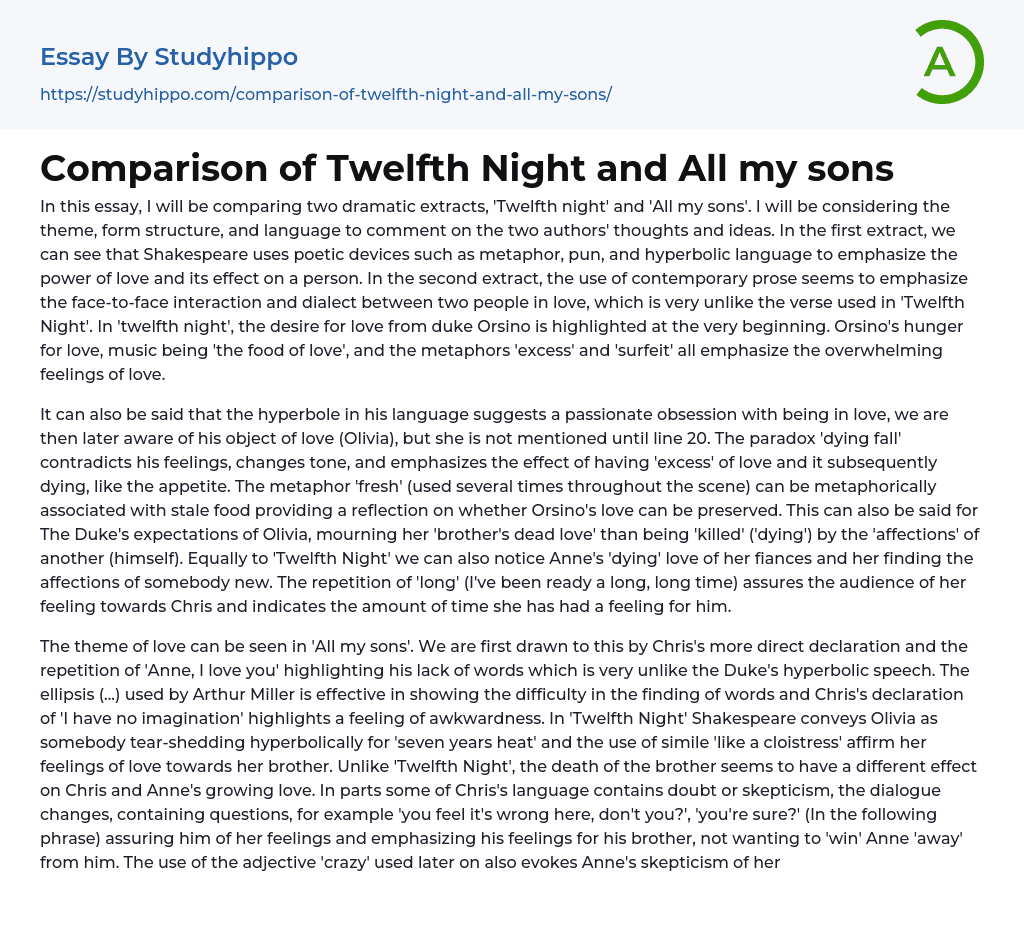

Comparison of Twelfth Night and All my sons Essay Example
In this essay, I will be comparing two dramatic extracts, 'Twelfth night' and 'All my sons'. I will be considering the theme, form structure, and language to comment on the two authors' thoughts and ideas. In the first extract, we can see that Shakespeare uses poetic devices such as metaphor, pun, and hyperbolic language to emphasize the power of love and its effect on a person. In the second extract, the use of contemporary prose seems to emphasize the face-to-face interaction and dialect between two people in love, which is very unlike the verse used in 'Twelfth Night'. In 'twelfth night', the desire for love from duke Orsino is highlighted at the very beginning. Orsino's hunger for love, music being 'the food of love', and the metaphors 'excess' and 'surfeit' all emphasize the overwhelming feelings of love.
It can also be
...said that the hyperbole in his language suggests a passionate obsession with being in love, we are then later aware of his object of love (Olivia), but she is not mentioned until line 20. The paradox 'dying fall' contradicts his feelings, changes tone, and emphasizes the effect of having 'excess' of love and it subsequently dying, like the appetite. The metaphor 'fresh' (used several times throughout the scene) can be metaphorically associated with stale food providing a reflection on whether Orsino's love can be preserved. This can also be said for The Duke's expectations of Olivia, mourning her 'brother's dead love' than being 'killed' ('dying') by the 'affections' of another (himself). Equally to 'Twelfth Night' we can also notice Anne's 'dying' love of her fiances and her finding the affections of somebody new. The repetitio
of 'long' (I've been ready a long, long time) assures the audience of her feeling towards Chris and indicates the amount of time she has had a feeling for him.
The theme of love can be seen in 'All my sons'. We are first drawn to this by Chris's more direct declaration and the repetition of 'Anne, I love you' highlighting his lack of words which is very unlike the Duke's hyperbolic speech. The ellipsis (...) used by Arthur Miller is effective in showing the difficulty in the finding of words and Chris's declaration of 'I have no imagination' highlights a feeling of awkwardness. In 'Twelfth Night' Shakespeare conveys Olivia as somebody tear-shedding hyperbolically for 'seven years heat' and the use of simile 'like a cloistress' affirm her feelings of love towards her brother. Unlike 'Twelfth Night', the death of the brother seems to have a different effect on Chris and Anne's growing love. In parts some of Chris's language contains doubt or skepticism, the dialogue changes, containing questions, for example 'you feel it's wrong here, don't you?', 'you're sure?' (In the following phrase) assuring him of her feelings and emphasizing his feelings for his brother, not wanting to 'win' Anne 'away' from him. The use of the adjective 'crazy' used later on also evokes Anne's skepticism of her long-lasting feelings towards her fiance's brother.
Both extracts are certainly very different in their form and structure and language (Shakespeare's use of hyperbolical language and poetic devices help him convey Orsino's idea of love and his self-confident role. Arthur Mill's use of clumsy face-to-face dialect indicates the difficulties in declaring love. But In their themes, we can pick
out similarities, love, and desire, and the effect death can have on these feelings.
- American Literature essays
- Between The World and Me essays
- Book Report essays
- Book Review essays
- Book Summary essays
- Books essays
- Character essays
- Coming of Age essays
- Dante's Inferno essays
- Everyday Use essays
- Flowers for Algernon essays
- Genre essays
- Greek Mythology essays
- Incidents in The Life of a Slave Girl essays
- Letter essays
- Literary Criticism essays
- Literary devices essays
- Literature Review essays
- Metaphor essays
- Myth essays
- Play essays
- Plot essays
- Poem essays
- Poetry Analysis essays
- Protagonist essays
- Reader essays
- Reason essays
- Rhetoric essays
- Rhetorical Question essays
- Rhyme essays
- Simile essays
- Tragic Hero essays
- Translation essays
- Understanding essays
- Utopia essays
- Villain essays
- Writer essays
- A Doll's House essays
- A Midsummer Night's Dream essays
- A raisin in the sun essays
- A Streetcar Named Desire essays
- An Inspector Calls essays
- Death of a salesman essays
- Everyman essays
- Fences essays
- Hamlet essays
- Hedda Gabler essays
- Iago essays
- King Lear essays
- Macbeth essays



